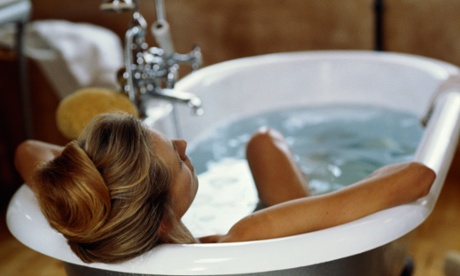
Who would ever want to be dirty? Yet according to a recent survey carried out by a cosmetics company, this is just what “a shocking one in three” women have “admitted” to, with 33% leaving it as long as three days from wash to wash. Worse, “four out of five women don’t shower every day”. Ah yes of course: this is all about the daily shower or bath, that well-known upper-class indicator.
Back in the days before convenient plumbing, almost no one would have bathed daily; and almost everyone would have simply “freshened up with a quick wipe” in the morning and evening – which is what 57% of women in 2015 told the survey. However, it subsequently became an axiom that the 20th-century evening-dress and grooming routine should always include a bath. Later on, this transmuted into taking a shower, which is easy enough for any social aspirant; or indeed anyone wanting to wash off the dust and fatigue of a day’s hard work. This is what public baths were originally for, when very few people had a bathroom; and we all know that coal miners had to wash before they could eat or sleep, as is true for those in the building trades today.
Cleanliness is relative. Human bodies do not disintegrate if they have not been bathed for three days. The truth is that most people do not have the time or energy for an evening grooming routine – 89% said they would like to improve their body hygiene but blamed tiredness for their lack of showers or baths. This is unnecessarily apologetic, when most people lead busy lives that get increasingly hectic as the day wears on. Many people have other things to do by 6pm, such as looking after children and cooking meals; maybe they haven’t even left work yet.
Morning showers are more frequent, but not always possible in a family situation. Yet we are all still better groomed than our ancestors, thanks to our excellent bathrooms.
Another point that leaps out for the grooming historian, apart from class, is age. Why is it that even those parents who don’t take an early evening bath, regard it as an absolute ritual to bathe their children at 6pm every day? It’s because they are training their children in habits of cleanliness, handed down directly from Victorian nurseries. But how effective is it? How many parents find that their children’s grooming and tidying routines break down immediately they leave the surveillance of the parental home? One suspects that the 63% who don’t bother removing make up before going to sleep may be young adults. Ditto the one in eight who don’t brush their teeth before bed. They presumably have more important things to do with their time. But they will probably train their offspring exactly as their parents trained them, because this is what humans do. It is how standards are maintained and passed on.
The really sad thing about the survey is that personal grooming time is still a relative luxury, and that we are still time-poor. We have almost completely lost sight of the extensive life-work balance that used to be the essence of the philosophy of Hygeia, but which was always confined to the idle rich until the 19th century. Working-hours legislation gave us a minimum of 10 then eight working hours per day; then Saturday afternoons off; then Saturday mornings off; and finally the half-days that shops used to have on Wednesdays or Thursdays to allow workers time off for sports. All these gains were painfully hard-won from employers, but have gradually been eroded over the same period that wages have stagnated, and hours increased, under the same advanced capitalism that demands excellent personal grooming but spares little time in which to perform it.
Personal hygiene is now squeezed into our five-day working week, in an average office day which now ends (for both men and women) at 6-7pm rather than 4-5pm – if they are lucky. As in the past, Saturday is still often the only day there is time to get a haircut, or (these days) a pedicure, manicure, or a massage. You can get time off for the doctor or a dental emergency, but not the hairdresser, the yoga class, or the sports practice. We should be fighting for a four-day week, or at very least for the resurrection of the hygienic half-day.

